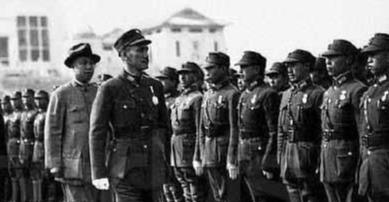After the fall of the Qing government, China fell into a long period of warlordism. Several warlords have been fighting among themselves for central power, and in this case, various people have constantly appeared on the Chinese political scene. Before the Central Plains War, the whole of China was basically divided into Feng Yuxiang's Northwest Army, Yan Xishan's Jin Sui Army, Zhang Xueliang's Northeast Army, and Chiang Kai-shek's Central Army. These four forces were the largest forces in China at that time, and Chiang Kai-shek was the nominal Chinese co-lord, but under such an identity there were obviously great problems, such as Yan and Feng, who had always violated Chiang Kai-shek's orders, and even formed an alliance to launch the Central Plains War to jointly oppose Chiang Kai-shek.

In the Battle of the Central Plains, Yan Xishan was undoubtedly the main force, and the Jin Sui Army commanded by Yan Xishan at that time was also one of the most powerful military forces in the Central Plains. His army exceeded 200,000, but the war came to an end, but because of the sudden change in the domestic situation, the Jin Sui army finally lost miserably. Yan Xishan also announced that Xia Ye gave up his rule over Shanxi, and at this time Shanxi seemed to have been taken into pocket by Chiang Kai-shek, but Chiang Kai-shek finally lost control of the Jin Sui Army.
And Chiang Kai-shek's inability to completely control the Jin Sui Army is also understandable, because although Yan Xishan had already gone to the wilderness at that time, he still had extremely high prestige and power in Shanxi, and he was only nominally in the upper and lower fields. The vast majority of Shanxi officials and troops were still actually in the hands of Yan Xishan, which fundamentally avoided the possibility that Chiang Kai-shek wanted to pocket the Jin Sui army.
Moreover, at that time, in the central plains, although Chiang Kai-shek won the victory in the Central Plains War, he was not a single family, and Zhang Xueliang's Northeast Army and Feng Yuxiang's Northwest Army still existed. Although Feng Yuxiang was greatly weakened, and Zhang Xueliang had no possibility of competing with Chiang Kai-shek for China, Zhang Xueliang obviously would not sit idly by and watch Chiang Kai-shek continue to expand his power. Moreover, Li Zongren within the Nationalist government and the new Gui clan led by li zongren were also constantly obstructing Chiang Kai-shek's control of the whole country.
In the end, under the balance of Zhang Xueliang and Chiang Kai-shek, neither of them could formally control the Jin Sui Army, so they could only let the Jin Sui Army develop separately. They all hoped to support people within the Jin Sui Army to indirectly control the Jin Sui Army, so they elected Fu Zuoyi and Shang Zhen. But Fu Zuoyi himself was very self-aware and politically sensitive, and Fu Zuoyi was also a famous general born in the Jin Sui Army. He knew that Yan Xishan's control over the Jin Sui Army was very strong, and even if he barely ascended to the top of the military and political ranks in Shanxi Province, it was absolutely impossible to sit in this position. The same was true for Shang Zhen, after all, Zhang Xueliang and Chiang Kai-shek at that time had to balance each other's strength, and it was impossible to directly intervene in the forces of the Jin Sui Army. The final result was that Yan Xishan came to power again and became the de facto controller of Shanxi.
At that time, the warlord melee brought great pain to the Chinese people, and a government that could not be completely unified could not unite against the aggression of foreign enemies. In the end, under the heroic efforts of countless revolutionary martyrs, New China was established. We have a happy and beautiful life today, so we must firmly remember that tragic history and let him never happen in this land again.